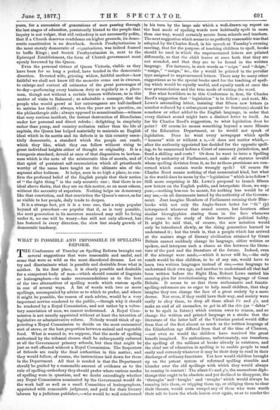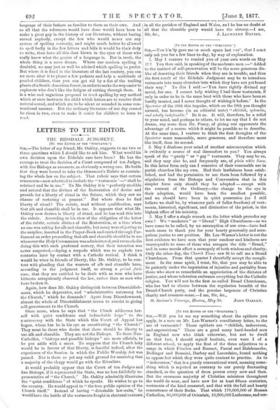WHAT IS POSSIBLE AND IMPOSSIBLE IN SPELLING REFORM.
THE Conference of Tuesday on Spelling Reform brought out several suggestions that were reasonable and useful, and some that were as wild as the most disordered dreams. Let us try and discriminate what is possible and desirable from what is neither. In the first place, it is clearly possible and desirable for a competent body of men—which should consist of linguists or lexicographers—to make recommendations as to the best of the two alternatives of spelling words which custom spells in one of several ways. A list of words with two or more spellings, accompanied by advice as to which to prefer, and where it might be possible, the reason of such advice, would be a very important service rendered to the public,—though why it should be rendered by a Royal Commission, and not rather by a volun- tary association of men, we cannot understand. A Royal Com- mission is not usually appointed without at least the intention of legislative or administrative reform. Nobody would think of ap- pointing a Royal Commission to decide on the most economical sort of stove, or the best proportion between animal and vegetable food. What is wanted is, we suppose, that the mode of spelling authorised by the tribunal chosen shall be subsequently enforced at all the Government primary schools, but then that might be just as well effected without a Royal Commission. The Inspectors of Schools are really the final authorities in this matter, and they would follow, of course, the instructions laid down for them in the Department. All that is needed is that the Department shank} be guided by a reasonable amount of evidence as to the rule of spelling-orthodoxy they should prefer where various modes of spelling were in question, and we doubt exceedingly whether any Royal Commission nominated by the Government would do the work half as well as a small Committee of lexicographers, appointed with reasonable judgment, and paid for their literary labours by a judicious publisher,—who would be well reimbursed in his turn by the large sale which a well-drawn-up report on- the beat mode of spelling words now habitually spelt in more than one way, would certainly secure from schools and teachers. The next suggestion which seems to us perfectly reasonable was that adopted by Sir Charles Reed, in his speech at Tuesday's evening meeting, that for the purpose of teaching children to spell, books should be used in which the unpronounced letters are printed differently, so that the child learns at once both that they are not sounded, and that they are to be found in the written language. For instance, in such words as " reign " and " deign," "resign," "assign," &c., the g would be printed in the peculiar type assigned to unpronounced letters. There may be many other suggestions as to the special books used for the teaching of spell- ing which would be equally useful, and equally mark at once the true pronunciation and the true mode of writing the word.
But what bewilders us in this Conference is, first, Sir Charles Reed's suggestion that " legislation " is to follow ; and next, Mr. Lowe's astounding letter, insisting that fifteen new letters (a number reduced by a subsequent speaker to fourteen) should be somehow or other added to the English language, in order that every distinct sound might have a distinct letter to itself. As for Sir Charles Reed's suggestion, to what legislation does he point? Of course he means something beyond a mere Minute of the Education Department, or he would not speak of legislation. Does he want every newspaper which spells "honour" with or without a u, it does not matter which,— after the authority appointed has decided for the opposite spell- ing, to be summoned before a Court of summary jurisdiction, and fined a shilling and costs ? Or does he want to issue a Spelling Code by authority of Parliament, and make all statutes invalid whose spelling deviates from it, so far as those provisions are con- cerned which contain words wrongly spelt? Of course Sir Charles Reed means nothing of that nonsensical kind, but what in the world does he mean by the " legislation " which is to follow ? Still more surprising is Mr. Lowe's proposal to launch fifteen new letters on the English public, and interpolate them, we sup- pose,---nothing less can be meant, for nothing less would be of any use,—in all documents issued by the authority of the Govern- ment. Just imagine Members of Parliament conning their Blue- books with not only the Anglo-Saxon letter for " th " (?) interspersed wherever that sound occurs, but fourteen other similar hieroglyphics staring them in the face whenever they come to the study of their favourite political hobby. It might be said that, of course, the new notation would only be introduced slowly, as the rising generation learned to understand it ; but the truth is, that a people which has arrived at the mature stage of literary civilisation attained by Great Britain cannot suddenly change its language, either written or spoken, and interpose such a chasm as this between the litera- ture of the past and the literature of the future. Indeed, even if the attempt were made,—which it never will be,—the only result would be that children, to be of any use, would have to learn two written languages instead of one,—one language to understand their own age, and another to understand all that had been written before the Right Hon. Robert Lowe carried his amazing plan for revolutionising the written language of Great Britain. It seems to us that these enthusiastic and fanatic spelling-reformers are so eager to help small children, that they imagine they can change the face of a great society by a mere decree. Nor even, if they could have their way, and society were really to obey them, to drop all these silent b's and g's, and make an end of all anomalies, to get in all the dets (as " debts" is to be spelt in future) which custom owes to reason, and so change the written and printed language at a stroke that the literature of the latter half of the Victorian period would differ from that of the first almost as much as the written language of the Elizabethan age differed from that of the time of Chaucer, —not even so would the children have received the great benefit imagined. No enthusiasm, unfortunately, can transform the spelling of the millions of books already in existence, and the chief use of education in spelling is to enable people to read easily and correctly whatever it may be their duty to read in their discharge of ordinary functions. Yet how would children brought up on the patent system of reformed spelling stumble and blunder over the old spellings with which they would always be coming in contact! The silent b's and g's, the anomalous diph- thongs that ought to be obsolete and yet declined to disappear, the throughs ' and boughs' and coughs' which would always be running into them, or tripping them up, or obliging them to clear their throats, would soon compel any of them who were worth their salt to learn the whole lesson over again, so as to render the language of their fathers as familiar to them as their oivn. And so all that the reformers would have done would have been to make a great gap in the history of our literature, without having served anybody, except the few who would never use any system of spelling correctly, and might much better be allowed to spell badly in the few letters and bills it would be their duty to write, than have all this dust blown in the eyes of those who really know what the genius of a language is. But in truth, the whole thing is a mere dream. Where our modern spelling is doubtful, we may just as well be advised which spelling to prefer. But where it is fixed in the literature of the last century, you can no more alter it to please a few pedants and help a multitude of puzzled children, than you can get rid by a fiat of the trailing plants of a South-American forest, in orderto make the way easier to explorers who don't like the fatigue of cutting through them. It is a wise and sagacious proposal to teach spelling by any method which at once instructs the child which letters are to receive their natural sound, and which are to be silent or sounded in some con- ventional manner. But the ordinary literature of our day cannot be riven in two, even to make it easier for children to learn to read.



































 Previous page
Previous page